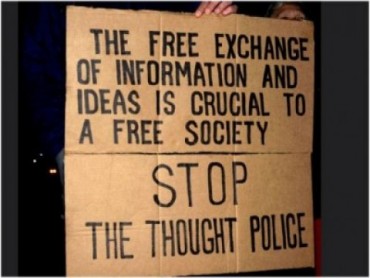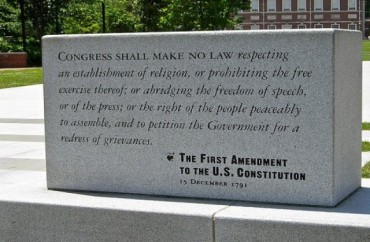
In this column three weeks ago it was shown — rather stupefyingly — that some people didn’t quite know what to make of the academic freedom and free speech resolution passed by University of Wisconsin Board of Regents.
Worse, some were actually unhappy about the resolution.
“In the [resolution], it’s OK for students to … say hate speech or discriminatory speech that might be offensive or not conducive to an open and inclusive learning environment for everybody,” complained an organizer of a “Black Out March.”
“But,” you might say, “that’s what free speech is.”
Or, more accurately today, that’s what it’s supposed to be.
Emory University’s Anaïs Hussung is yet another college student who agrees with the Black Out March protester, as well as with way too many of his college peers.
Hussung’s main problem is the anonymous social media platform Yik Yak:
In the most recent op-ed, “A Chilling Silence,” Emory senior Alex Reibman criticized the demand to block Yik Yak from Emory’s campus. He argues that anonymous speech is an essential part of our conversations about race, free speech and democracy. Reibman claims that the BSEU represent “political correctness.” He also claims the demands infringe on others’ rights and are counter-productive to improving the status of minorities in our society.
Reibman assumes that Yik Yak is an app for uncensored free speech that can provide a useful platform for fighting racism (and other forms of oppression), but this assumption falls apart under scrutiny. One of Yik Yak’s core mechanics is that users can up-vote or down-vote posts they read, which generates a rating for each post (the number of up-votes minus the number of down-votes). If at any point a post has a rating of negative five, it is permanently removed. If one of the fundamental components of free speech is protecting unpopular opinions and giving individuals who hold minority opinions a chance to express themselves without fear of censorship, the whole concept of removing unpopular comments completely undermines Yik Yak’s ability to provide a space for free speech. It is essentially censorship by majority rule.
He makes a good point about the down-vote aspect of the app; however, that ability is most certainly utilized by both sides of any argument. Not to mention, it wouldn’t necessarily take a majority to “vote down” what is actually a popular view.
And then the obvious: Yik Yak is hardly the only social media app out there.
Now comes the scary part:
“I would further question the supposed centrality of free speech and intellectual discourse in combatting [sic] oppression and bigotry. Too often, ‘debate’ is merely smokescreen,” Hussung says.
He attempts to limit this rationale to outright bigots (who won’t be persuaded about anything no matter what), and uses the debate about … climate change to support his stance — the ‘ol “the science is settled.”
But “consensus” is not science, and there is plenty to discuss and debate when it comes to the subjects of oppression and bigotry. (By the way, here’s something consider when it comes to climate change. Would Hussung question that “supposed centrality”?)
All we really see here is the all-too typical progressive desire to squelch that which they do not like. And when the squelching doesn’t work out as preferred, then the “-ist” and “-ism” labels comes out.
 Here Hussung is taking a cue straight out of the critical race theory (CRT) playbook — actually questioning the use of rationality in dissecting issues in part because it is “traditionally Western”:
Here Hussung is taking a cue straight out of the critical race theory (CRT) playbook — actually questioning the use of rationality in dissecting issues in part because it is “traditionally Western”:
Too often, we are guided by our attachments to certain ideas such as “free speech” to the extent of seriously neglecting the experiences of the oppressed. Focusing on rationality, debate and traditional Western concepts like free speech can tie us to established ideologies and numb us to the pain of those around us. It can easily be a way, consciously or subconsciously, of imposing the will of the powerful upon the oppressed. The fight against anti-Black sentiments must begin with, and remain centered on Black people and their experiences, desires and political vision. An attempt by white people to ignore the work and will of Black people and set the terms for the fight against racism is still an attempt to keep structural power in white hands. Essentially, it is just a rebranding of racism.
The previous point about quelling speech is made perfectly here: You’re a “[re]branded” racist if you ignore groups like Black Lives Matter and/or attempt to debate “terms” with them.
RELATED: Fear the Future: College students’ views on free speech are … rather worrisome
Judge Richard Posner of the Seventh Circuit Court of Appeals (who would be a racist using Hussung’s terms) from 1997 appears directly to address the student columnist’s point:
What is most arresting about critical race theory is that…it turns its back on the Western tradition of rational inquiry, forswearing analysis for narrative. Rather than marshal logical arguments and empirical data, critical race theorists tell stories — fictional, science-fictional, quasi-fictional, autobiographical, anecdotal—designed to expose the pervasive and debilitating racism of America today. By repudiating reasoned argumentation, the storytellers reinforce stereotypes about the intellectual capacities of nonwhites.
Is it any wonder why he called adherents to CRT “the lunatic core of radical legal egalitarianism”?
Hussung concludes his article:
Instead of beginning our conversations with ideological allegiances to concepts like free speech, and employing those concepts to defend the status quo, we must start centering and caring about the people who are suffering most. We must respect their decisions and let our ideologies grow from there. If we define free speech in a way that would defend Yik Yak, in spite of the immense harm it has caused Black students, then I’m not interested in free speech.
Ideological allegiances to free speech. If we define free speech in a way … that causes harm.
While Judge Posner may refer to Hussung’s views on speech as “lunatic,” these views are, as Slate’s Will Oremus writes, widely taught and studied.
Should we worry that Hussung’s opinions on free expression may become reality? In a word, yes.
Supreme Court Justice Elena Kagan gave a lecture all about CRT back in 1993. In it, she notes how Derrick Bell, one of the early proponents of CRT, said the “law must take into account the experiences of minorities, which he attempts to explicate through dialogues and stories.”
Does this not sound familiar — as in the demands of every race-based protest group on American campuses today?
Justice Sonia Sotomayor, too, was influenced by CRT, and a reading of her dissent in Schuette v Coalition to Defend Affirmative Action arguably confirms this.
Justice Ruth Bader Ginsburg, who joined Sotomayor in the Schuette dissent, wrote in her dissent in the race-based college admissions case Gratz v. Bollinger that “Our jurisprudence ranks race a ‘suspect’ category, not because [race] is inevitably an impermissible classification, but because it is drawn for the purpose of maintaining racial inequality.”
The remaining progressive on the high court, Stephen Breyer, does not appear to possess as overt a proclivity for CRT as his (liberal) colleagues, but his views on free speech are certainly eyebrow-raising, and could most easily be applied in a CRT context.
Perhaps to no right-of-center individual’s surprise, even the American Civil Liberties Union (ACLU) is now relegating free speech rights to the back burner, as evidenced by its recent National Workplan.
As former ACLU member (and current member of Foundation for Individual Rights in Education — FIRE) Wendy Kaminer notes,
At the national level, ACLU has been exercising its right to remain silent on key free speech issues for years, in apparent deference to progressive support for restricting speech deemed racist, sexist, homophobic or otherwise exclusionary. Still, while it’s unsurprising, the ACLU’s withdrawal from free speech battles that could eventually lead the U.S. to adopt a Western European approach to regulating “hate speech” is indeed alarming. As threats to free speech intensify — on campus (thanks partly to arguably unconstitutional federal mandates) and in the remarkable tendency of some liberals to blame the victims of violence for giving offense to their murderers (remember Charlie Hebdo) — the ACLU’s timidity in protecting speech looks more and more like complicity in censoring it.
FIRE co-founder Harvey Silverglate adds that the “ACLU, more and more, pursues a political or social agenda where the overriding importance of the goal transcends, in the eyes of [its] leadership, the needed vitality of free speech principles neutrally and apolitically applied.”
Thankfully, we do have organizations like FIRE. But will they be enough if the next president nominates another Elena Kagan, Ruth Ginsburg, or Sonia Sotomayor as the replacement for a member of the Supreme Court’s conservative bloc?
Fear the future.
UPDATE: Mere hours after this article was published, Supreme Court Justice Antonin Scalia passed away.
RELATED: Texas A&M sics police on mean speech directed at visiting students
Like The College Fix on Facebook / Follow us on Twitter
IMAGE: Stephen Melkisethian/Flickr







Please join the conversation about our stories on Facebook, Twitter, Instagram, Reddit, MeWe, Rumble, Gab, Minds and Gettr.